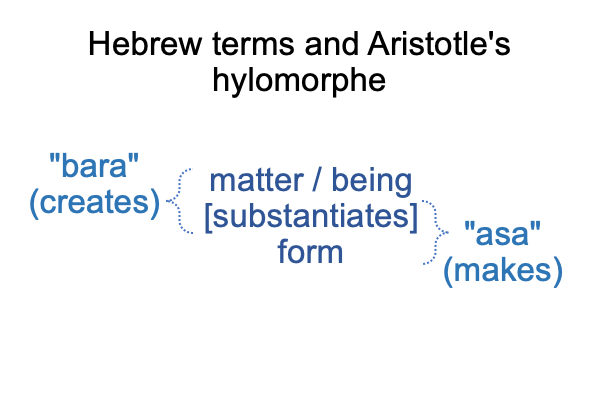0018 What is proposition two?
In the ancient Near East and in the Old Testament, the Hebrew terms for “creating” (bara) and making (asa) applies to establishing order by assigning roles and functions.
0019 In the modern world, “creating” and “making” concern material production of things, irrespective of roles and functions. Of course, moderns have the luxury of centuries of research into the material sciences. Modern science follows the dictates of the Positivist’s judgment, which includes the empirio-schematic judgment.
The Positivists take the plain-speaking approach out of the reformed churches and into the natural sciences. Mathematical and mechanical models eschew formal and final causalities (the stuff of roles and functions) and extol material and instrumental causalities (the stuff that one can explicitly abstract and specify).
0020 The empirio-schematic judgement does not apply to the old Hebrew terms. Therefore, the Positivists declare, “Genesis is not scientific.”
Walton tries to respond, “But, that is not the point of Genesis.”
Then, the Positivists persist, “Then, are you saying that Genesis is esoteric knowledge? If so, then plain-speaking interpretations of Genesis are not possible.”
0021 The Positivists, the heirs of the mechanical philosophers, place Walton in a difficult position. Walton belongs to a plain-speaking tradition. Positivists say that the only way to speak plainly, is to speak scientifically.
Walton replies, “Okay, let us look at the other appearances of the key words of Genesis 1, bara and asa, and fashion a scientific interpretation.”
0022 The results?
Bara means to create things with roles and functions.
Asa means to make things with roles and functions.
The ancients focus, not on material phenomenal reality, but on things themselves.
Here is a plain-speaking result that appeals to the science-minded.
0023 I would like to associate bara and asa to Aristotle’s hylomorphe, portrayed as an exemplar of Peirce’s category of secondness. Like the Latin term, esse, being as existent, bara associates to being [substantiates]. Like the Latin term, essence, asa associates to [substantiating] form.
I write esse as esse_ce, the complement of essence.
In the following figure, I portray the Hebrew terms.

0024 In sum, key Hebrew terms in Genesis associate to later Greek philosophical insights. Esse_ce (the fact that it exists) and essence (the fact that it has form) belong to the noumenon. The noumenon stands outside the empirio-schematic natural sciences. So, the noumenon is derided as “esoteric”. Yet, the noumenon, described as a hylomorphe, is the gateway to natural philosophy.
